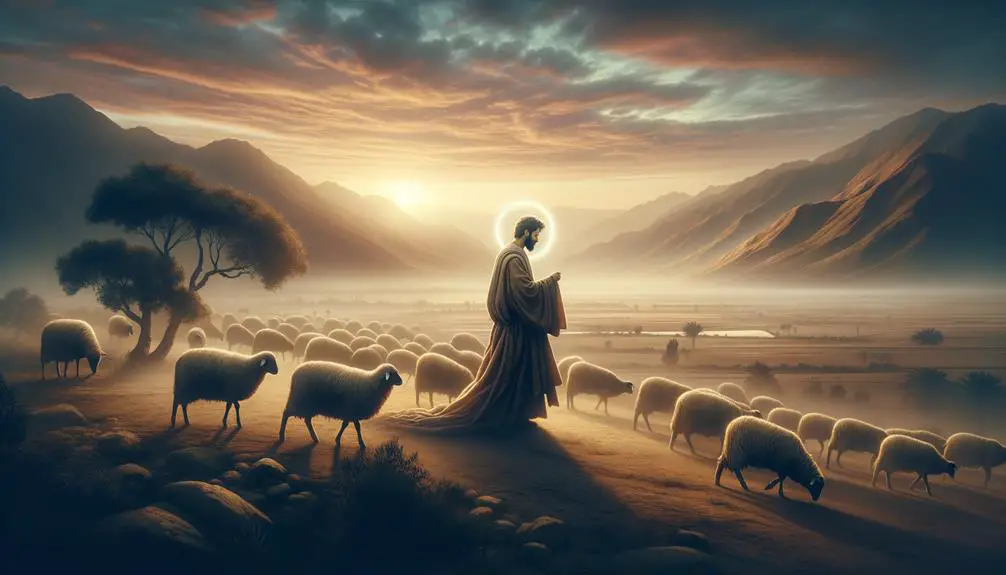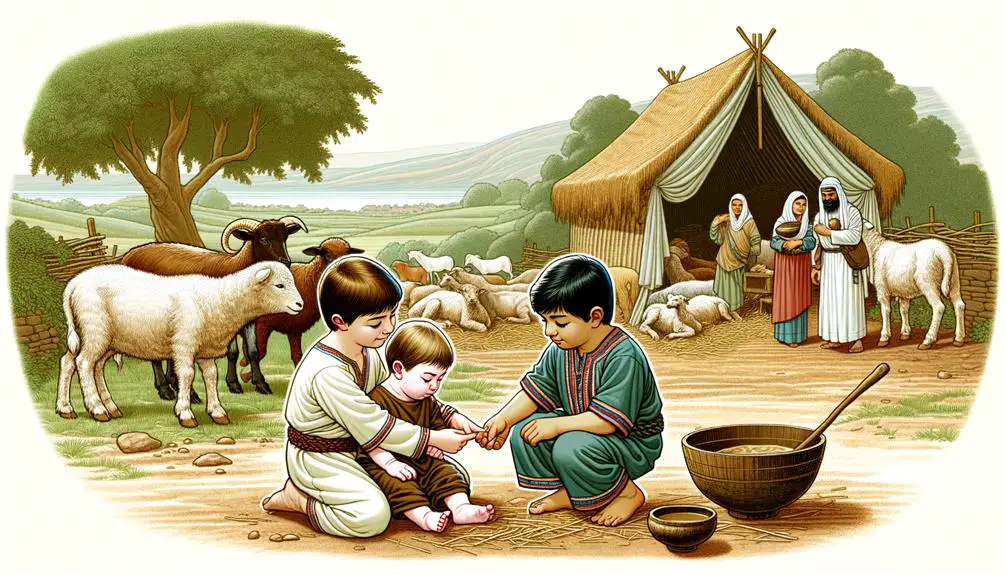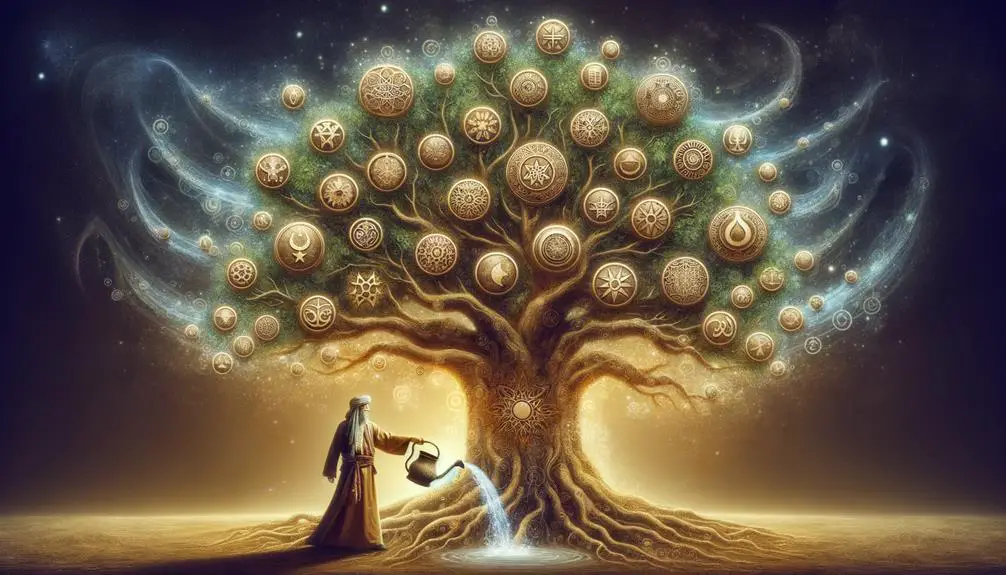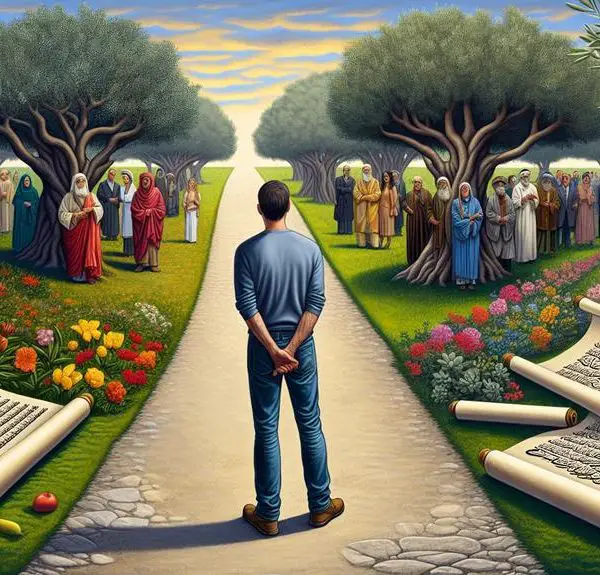Biblical patriarch Yakub's cunning and dreams shape nations, but does his legacy ultimately reveal redemption or deceit?

Yakub in the Bible
As you sow, so shall you reap, and the biblical story of Yakub (Jacob) is a testament to this timeless adage. You'll discover how his early life and cunning in securing his birthright set a complex path of events in motion, from deceiving his father, Isaac, to his profound encounter in the dream of a ladder reaching to heaven.
His experiences with marriage, family growth, and a mysterious wrestling match are pivotal, shaping not just his destiny but that of an entire nation. Yet, the question lingers: how do these episodes influence his legacy and the very foundations of faith?
Unraveling this thread may offer insights into the enduring power of transformation and redemption.
Key Takeaways
- Yakub's life was marked by significant divine encounters, including dreams and wrestling with an angel, that shaped his spiritual journey.
- His actions, driven by ambition and deception, led to familial conflicts but also to his transformation and renaming to Israel.
- Yakub's marriages and children formed the foundation of the twelve tribes of Israel, influencing religious and cultural narratives.
- His story illustrates the balance between human effort and divine intervention, emphasizing the importance of faith and covenantal promises.
Early Life and Birthright

In examining the early life and birthright of Yakub, it's crucial to note that he was born holding his twin brother Esau's heel, symbolizing his later struggle for primogeniture and the blessings of their father, Isaac. This act of holding the heel, more than a mere physical gesture, signified the inception of a twin rivalry that would define much of their lives. You'll find that this rivalry wasn't solely between the brothers but was exacerbated by parental preference, a common theme in biblical narratives, which further intensified their competition.
The concept of the firstborn's birthright, which Yakub later sought to obtain, was of significant importance in the biblical context. It wasn't just about material inheritance but also about carrying on the spiritual and familial leadership. This makes Yakub's desire for the birthright more than a quest for wealth; it was a pursuit of a role ordained by divine promise.
Parental preference played a pivotal role in shaping Yakub and Esau's destinies. Isaac, their father, favored Esau for his hunting prowess, while Rebekah, their mother, favored Yakub. This preference wasn't a mere matter of affection but influenced decisions that would alter the course of their family's history and, by extension, the history of the people of Israel.
Understanding this dynamic of twin rivalry and parental preference is essential in grasping the complexities of Yakub's character and his motivations. It sets the stage for the events that follow, where these early life experiences and inherent family dynamics propel Yakub towards actions that would fulfill his destiny, yet not without further controversy and conflict.
The Deception of Isaac
Yakub's quest for his father Isaac's blessing led him to execute one of the most controversial acts of deception in biblical history. This incident, deeply embedded in the narrative of familial dynamics, sheds light on the profound effects of parental favoritism and the lengths to which individuals might go to secure their perceived rightful place within their family and society.
Isaac, now old and blind, intended to bestow his blessing upon his firstborn, Esau, a tradition that carried significant spiritual and material inheritance. However, Rebekah, Yakub's mother, favored Yakub and devised a plan to deceive Isaac, ensuring Yakub received the blessing instead. This plan involved disguising Yakub to mimic Esau's appearance and mannerisms, exploiting Isaac's blindness.
Yakub's compliance with his mother's scheme and his active participation in deceiving his father highlight the complexities of his character and his desperate desire for approval and blessing. The successful deception not only secured Yakub the coveted blessing but also set off a chain of events marked by Esau's fury and a deep rift between the brothers. Esau's fury upon discovering the deceit was palpable, leading to Yakub's flight to avoid his brother's wrath.
This episode is critical in understanding the dynamics of parental favoritism, sibling rivalry, and the ethical boundaries individuals are willing to cross for personal gain. It also foreshadows the long journey of transformation Yakub is to undergo, eventually leading to significant spiritual revelations and reconciliation within the fractured family.
Jacob's Ladder Dream

Fleeing his brother Esau's wrath, Jacob experienced a profound spiritual vision that came to be known as Jacob's Ladder Dream, a pivotal moment in biblical narrative that bridges the divine with the human experience. This dream not only signifies a turning point in Jacob's personal journey but also encapsulates key themes of dream symbolism and spiritual ascension within the broader context of religious texts.
Analyzing the dream reveals several critical elements:
- The Ladder: Symbolizing the connection between heaven and earth, the ladder in Jacob's dream offers a vivid depiction of spiritual ascension. It suggests that despite the physical realm we inhabit, there exists a direct path to the divine, accessible to those who seek it earnestly.
- Angels Ascending and Descending: This imagery emphasizes the continuous interaction between the divine and the earthly. It conveys that the spiritual realm isn't isolated but actively involved in human affairs, guiding and protecting.
- God's Promises: The dream also serves as a conduit for God's reassurances to Jacob. These promises include the bountiful land, numerous descendants, and protection—underscoring the covenant between God and Abraham's lineage.
- Jacob's Response: Upon awakening, Jacob's actions—setting the stone he used as a pillow as a pillar and anointing it—signify his acknowledgment of the holy ground and his commitment to worship. This act of faith marks a significant spiritual awakening and dedication.
Jacob's Ladder Dream, with its deep symbolism, not only illustrates Jacob's spiritual ascension but also invites reflection on the interconnectedness of the human and divine, offering insights into the nature of divine promises and human response.
Marriage and Family Growth
Jacob's journey into marriage and subsequent family expansion significantly shapes the narrative arc of his life, introducing complex dynamics that underscore themes of love, conflict, and divine providence within the biblical text. His experiences with marriage, beginning with his union to Leah and Rachel, delve deeply into ancient customs, such as dowry practices, which were integral to marriage agreements of the time. These practices not only facilitated the marriages but also set the stage for the complex relational dynamics that followed.
From Leah's perspective, her marriage to Jacob, orchestrated by her father Laban as a result of dowry practices, introduces a poignant narrative of love, deception, and the desire for recognition. The text reveals how dowry practices, while customary, could also lead to familial tension and competition, especially evident in Leah's struggle for Jacob's affection against her sister Rachel. This competition, underpinned by the desire for offspring, further complicates the family dynamic, illustrating the societal pressures and personal desires that shaped their lives.
The expansion of Jacob's family, through his marriages to Leah and Rachel, and his unions with their handmaids, Zilpah and Bilhah, reflects the patriarchal and polygamous practices of the time. This family growth, marked by the birth of his children, who'd become the founders of the twelve tribes of Israel, highlights the importance of lineage and legacy in biblical narratives.
Analyzing Jacob's marriage and family growth offers insights into the complexities of human relationships, societal norms, and divine intervention, revealing how these elements intertwine to shape the biblical story of Jacob.
Wrestling With the Angel

You must consider the encounter between Yakub and the angel as pivotal, not only for its immediate physical struggle but for its profound implications on Yakub's identity and spirituality.
This event signifies a transformation, where the renaming of Yakub to Israel marks a significant shift in his role and destiny.
Analyzing the physical and spiritual dimensions of this encounter sheds light on its broader theological and existential meanings within the Biblical narrative.
Angelic Encounter Meaning
In the biblical narrative, wrestling with the angel represents a transformative encounter that signifies a pivotal moment of spiritual awakening and identity formation. This event isn't just a physical struggle; it's rich in symbolism and spiritual messages. Here are four key insights into its meaning:
- Divine encounters often challenge and refine personal faith, acting as catalysts for spiritual growth.
- Wrestling with an angel symbolizes the intense, personal struggles that precede significant breakthroughs in understanding divine will.
- These encounters can serve as a conduit for receiving spiritual messages, guiding individuals on their life's path.
- Lastly, such experiences emphasize the necessity of perseverance in one's spiritual journey, highlighting the rewards of resilience in the face of uncertainty.
Understanding this narrative helps frame personal struggles as opportunities for divine communication and spiritual enhancement.
Identity Transformation Significance
Wrestling with the angel marks a crucial moment of identity transformation, where struggle becomes a forge for personal and spiritual evolution. This pivotal encounter isn't just a physical altercation but a symbolic journey towards self-realization and divine acknowledgment.
The name evolution from Yakub to Israel signifies not only a personal change but echoes a broader cultural impact. It represents the transition from individual identity to a collective one, embodying the genesis of a nation under a covenant with God. This shift highlights the profound power of names in narrating one's life story and their ability to encapsulate the essence of one's character and destiny.
The cultural impact of this transformation extends beyond religious texts, influencing art, literature, and societal values, underscoring the timeless relevance of identity metamorphosis.
Physical and Spiritual Implications
Exploring the physical and spiritual implications of the encounter with the angel further illuminates the multifaceted nature of this transformative event.
- Physical struggle: This wrestling match signifies a tangible confrontation, symbolizing life's hardships and the persistence needed to overcome them.
- Spiritual awakening: Yakub's wrestle transcends physicality, marking a profound spiritual awakening that aligns him closer to divine justice and understanding.
- Divine justice: The struggle embodies the intricate dance between human effort and divine intervention, illustrating how divine justice often manifests through personal trials.
- Covenantal promises: This event reaffirms the covenantal promises between God and Yakub, underscoring the importance of faithfulness and perseverance in fulfilling one's destiny according to divine will.
Legacy and Descendants

Yakub's legacy and his descendants have profoundly shaped theological narratives and influenced cultural identities across generations. The cultural impact of Yakub's lineage is undeniable, weaving a rich tapestry that extends beyond mere religious doctrine. Archaeological evidence has further solidified the historical significance of Yakub's progeny, offering tangible links to past civilizations and corroborating scriptural accounts. This intersection of faith and history serves not only to validate religious narratives but also to enrich the cultural heritage of numerous communities.
Analyzing the lineage of Yakub, you'll find that his descendants, notably the twelve tribes of Israel, have been pivotal in the formation and development of Abrahamic religions. The narratives surrounding these tribes have fostered a sense of identity and belonging among followers, influencing everything from ceremonial practices to moral and ethical codes. The endurance of these traditions underscores the lasting impact of Yakub's legacy on contemporary religious thought and practice.
Moreover, the historical and cultural significance of Yakub's descendants is evident in the ongoing archaeological discoveries that shed light on the ancient world. These findings not only corroborate biblical narratives but also provide insights into the societal structures, economies, and daily lives of these communities. Thus, Yakub's legacy transcends spiritual dimensions, offering a window into the human experience across millennia.
Frequently Asked Questions
How Does Yakub's Story in the Bible Differ From His Portrayal in Islamic Tradition?
You're exploring how Yakub's narrative varies between the Bible and Islamic tradition. While both sources share common themes, Islamic parallels often emphasize moral and spiritual lessons differently.
You'll notice narrative variations that highlight Yakub's faith and character in unique ways. Islamic tradition provides a more detailed account of his trials and virtues, offering a broader perspective on his significance.
This analytical comparison sheds light on the rich, diverse interpretations of Yakub's story.
Are There Any Archaeological Findings or Historical Evidences That Corroborate the Events of Yakub's Life as Described in the Bible?
You're asking if there's concrete archaeological evidence supporting Yakub's biblical narrative. While excavation methodology and artifact dating have advanced, pinpointing specific events to Yakub remains elusive.
Archaeologists face challenges in directly correlating finds with biblical figures due to the ancient nature of these texts and the general scarcity of personal identifiers in excavated materials. Thus, while some findings may align with the biblical era, directly tying them to Yakub's story is complex and largely speculative.
How Has Yakub's Character Been Interpreted and Represented in Different Cultures and Religious Traditions Outside of Christianity and Judaism?
Imagine you're exploring a vast gallery, where cultural myths and artistic depictions from around the world adorn the walls. In this gallery, you'll find Yakub's character interpreted and represented through various lenses, reflecting the richness of human imagination.
These portrayals, far removed from their Abrahamic roots, weave Yakub into the fabric of numerous traditions, showcasing how his story has been adapted and reimagined, offering a scholarly, objective analysis of his universal impact.
In What Ways Has Yakub's Story Influenced Modern Legal and Ethical Discussions, Particularly in the Context of Birthright and Inheritance Laws?
You're exploring how ethical inheritance and legal precedents have been shaped by historical narratives. These discussions often delve into the fairness of birthright and inheritance laws, questioning their ethical foundations.
How Do Contemporary Scholars Reconcile the Moral Ambiguities in Yakub's Actions, Particularly His Deception, With His Status as a Patriarch in the Judeo-Christian Tradition?
You're navigating a moral maze when considering how scholars balance the ethical dilemmas of a figure's deceit with his revered status.
They delve into a deep ethical analysis, weighing actions against the backdrop of divine favor.
This scholarly debate isn't black and white; it's a nuanced exploration of how ancient narratives shape our understanding of morality.
Through this lens, they seek to understand the complex interplay between human flaw and spiritual leadership.
Conclusion
In conclusion, you've traversed the tumultuous, transformative trajectory of Yakub, better known as Jacob, witnessing wiles and wisdom in equal measure. His life's labyrinth led from deceit to divine encounters, manifesting in matrimony and multiplication, culminating in a clash that changed his course.
Analyzing this ancestral architect's saga, we glean the gravity of growth, the potency of persistence, and the significance of spiritual struggle. Jacob's journey, juxtaposing human frailty with faith's fortitude, forever frames his legacy among his descendants.



Sign up